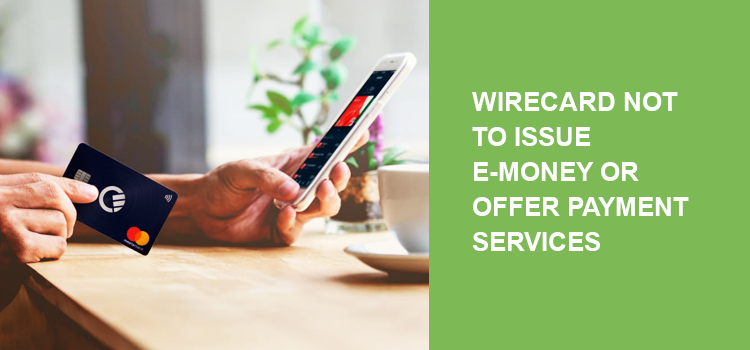As of June 26, 2020, Wirecard is no longer issuing e-money or conducting any payment business without the written consent of the Authority, according to the FCA official website.
Besides, the company has to inform its website visitors about these changes in its regulations. Additionally, Financial Conduct Authority mentioned that it’s prohibited for the company to offer any payment services whatsoever at the time being.
Any electronic funds obtained by Wirecard from its customers are to be returned to the source at once.
On top of that, the company also has to transfer all the funds to the safeguarding accounts that were specifically chosen by the Financial Authority where they can’t be reached by any third parties. The company agreed to do this by Monday, June 29. This is true for money on its international accounts outside the country, too.
And the management of the company has to ensure that all the available funds of the company are disclosed, and no assets owned by the venture are to be diminished.
A company that was once one the prominent fintech giant of Germany got into a tough spot with alleged accounting fraud.
But let’s recap what happened to Wirecard.
What happened to Wirecard?
Recently the company announced that almost €2bn has gone missing. According to the management of the company, this money was held by two ventures in Asia they previously collaborated with. However, after the authorities reached out to the above-mentioned ventures it became clear that they had no prior or ongoing business with Wirecard.
This raised even more questions.
But the problems started even earlier. In 2018, company management with Marcus Braun, at that time the CEO of Wirecard, didn’t publish the annual financial report of the firm. They announced that cash was missing but refrained from any further comments.
Today, the financial authorities believe that the issues with Wirecard could have been spotted sooner. The rejection to post a yearly report was the first red flag overlooked by the international financial authorities. If they paid close attention to it in the beginning, they could have prevented the consequences the company has to face now.
Cards issued by Wirecard subsidiaries, namely Wirecard Card Solutions Limited, are frozen for the time being. For now, they announce that the freeze is only temporary, but do not make any promises. Now that you know what happened to Wirecard, let’s explore what this practically means.
What does all this mean?
It’s still unclear whether Visa and MasterCard will revoke their licenses. Losing them would mean losing the business for Wirecard. Two major credit card brands are considering this possibility.
At the moment, the Financial Conduct Authority stepped in to take care of and protect the interests of users who entrusted their funds to Wirecard. Thus, Payoneer users are unable to withdraw money from their accounts or receive new payments on the card (this restriction doesn’t affect the virtual currency balance as well as money in excess of the max balance on a card).
All in all, Wirecard partners and consumers are actively looking for alternative Wirecard payments processing solutions to help them keep their businesses afloat and not lose thousands of dollars in missed sales.
And here’s our take on this situation.
Alternative Wirecard payments processing
We’re deeply sorry that so many merchants now have to face these difficulties through no fault of their own. So, we’re here to offer an alternative Wirecard payments processing. You can’t afford losing time without a payment processor. That is why here are our top three alternative Wirecard payments providers you can choose from today.
- Ikajo International.
An international payment processor supporting medium and high-risk businesses and offering 100+ alternative payment methods across 100+ countries and currencies.
Payment methods:
100+ including Bitcoin, American Express, Visa, MasterCard, EPS, Klarna, JCB, Qiwi, etc.
Countries supported:
150+ countries around the world
Fees:
Starting at 1.2% (vary depending on the monthly volumes and industry)
Important features:
Cashier – a one-stop payment SaaS platform
Free recurring billing
Customizable reports and real-time monitoring
Smart routing and cascading
HPP, API and plugins integration
Own cutting-edge fraud and chargeback prevention system
Dedicated customer and legal support - Braintree.
A multi-language one-stop payment platform. Optimized for mobile and secure, Braintree is a division of PayPal based in Chicago.
Payment methods:
American Express, Discover, JCB, Visa, MasterCard, ApplePay, AndroidPay, PayPal, Bitcoin
Countries supported:
United States, Canada, Australia, Europe, Singapore, Hong Kong SAR China, Malaysia, and New Zealand
Fees:
Starting at 1.9% + €0.30
Important features:
Hosted checkout
Recurring billing
No 24/7 support or Live chat
Fraud protection and credit card vault
Customizable reporting - 2Checkout.
An international payment service provider supporting credit and debit cards and PayPal payments.
Payment methods:
Major credit and debit card brands as well as Discover, PayPal, JCB, Diners.
Countries supported:
150+ countries worldwide
Fees:
2.4% + 30¢ with 1.5% extra for international payments
Important features:
15 languages and 26 currencies supported
No setup or annual maintenance fees
PCI DSS Compliance
Recurring billing
Invoicing and reporting
No Live chat or 24/7 support
Optimized for mobile users
Summary
So, even though the situation with Wirecard has touched and hindered many businesses, there are plenty of alternative Wirecard payments processing solutions to consider right now.
In our turn, we at Ikajo are ready to get you started with your payments on the website within two business days. Drop us a line or fill out the form here to get started now!





